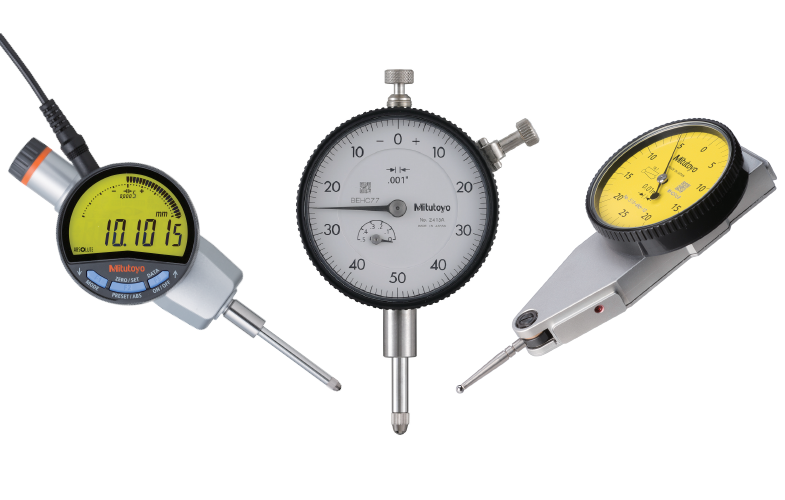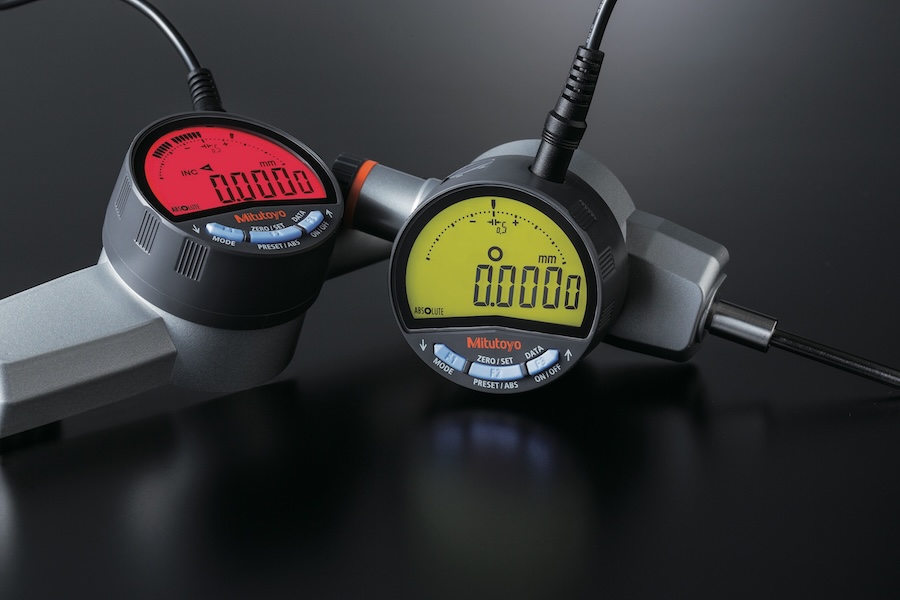 The manufacturing landscape is becoming more and more competitive which means the quality and precision of your measurement tools is now more important than ever. We are taking a closer look into how Mitutoyo Indicators, including digital, dial, and test indicators contribute to manufacturing success to enhance product quality and boost operational efficiency.
The manufacturing landscape is becoming more and more competitive which means the quality and precision of your measurement tools is now more important than ever. We are taking a closer look into how Mitutoyo Indicators, including digital, dial, and test indicators contribute to manufacturing success to enhance product quality and boost operational efficiency.
Mitutoyo offers a range of precision measurement tools, including digital, dial, and test indicators, that are some of the most accurate and trusted precision instruments in critical industries. These indicators are very durable yet are designed to be highly sensitive to provide precise measurements with constant, repetitive use, even on the shop floor.
The Role of Mitutoyo Indicators in Improved Manufacturing Precision
Mitutoyo’s indicators are integral in settings where high accuracy is essential and precision is non-negotiable. From automotive to aerospace, these tools ensure components meet stringent quality standards. In industries like automotive, aerospace, and medical devices, the margin for error in component production is minimal because even slight deviations can lead to significant consequences, including safety risks and increased costs due to failures or recalls.
Mitutoyo indicators are used to measure and verify the dimensions and tolerances of these many various parts during and after the manufacturing process. For example, in the automotive industry, these indicators might be used to precisely measure the dimensions of engine components to ensure they fit perfectly and operate efficiently. Similarly, in aerospace manufacturing, where the standards are even more rigorous, Mitutoyo indicators help ensure that parts like turbine blades and fuselage panels meet strict aerodynamic and safety criteria.
The role of these tools in such settings is to provide accurate, reliable measurements that guarantee that every component adheres to the required specifications. By doing so, they help maintain the high quality and reliability expected in these critical fields, ensuring that the final products are safe, effective, and efficient. This ability to deliver precise measurements consistently makes Mitutoyo’s indicators indispensable in industries where precision is, quite literally, a matter of success or failure.
Mitutoyo Indicators in Tooling Setup and Product Quality Control
Mitutoyo indicators are essential tools in both tooling setups and quality control phases of manufacturing processes. Here’s a more detailed look at how these indicators function in each context:
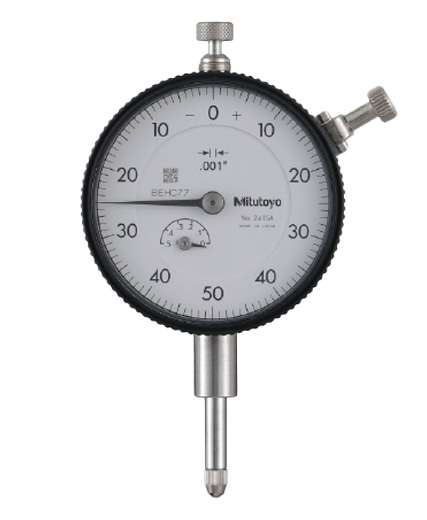
Tooling Setups
In manufacturing, tooling setups refer to the configuration and calibration of machines and equipment used to produce parts and components. This setup process is vital for ensuring that the machinery can manufacture products to the specified accuracy. Mitutoyo indicators are used to make precise adjustments to machines, ensuring that the settings and tooling align perfectly with the requirements of the task. For example, when setting up a milling machine or a lathe, a Mitutoyo indicator can be used to check if a cutting tool is positioned accurately to within thousandths of an inch or millimeter. This precision helps in avoiding the production of off-spec parts right from the start of the manufacturing process.
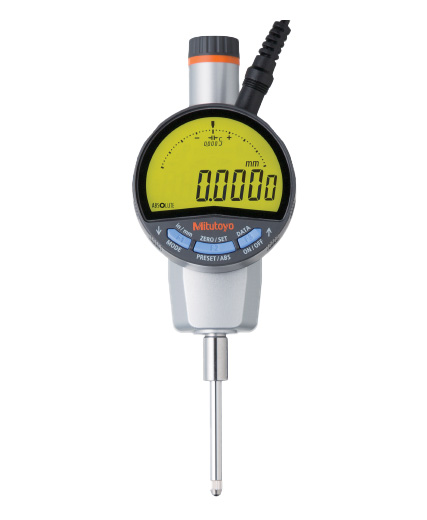
Quality Control
Once the manufacturing process is underway, Mitutoyo indicators are also used extensively in quality control to ensure each product meets the set quality standards and specs. During various stages of production, quality control technicians use these indicators to measure the dimensions, alignment, and movement of parts to ensure they are within the tight tolerances required. This might include checking the depth of a machined slot, the flatness of a surface, or the concentricity of a cylindrical part.
The consistent use of Mitutoyo indicators in quality control ensures that every product matches the predefined standards before it moves to the next stage of production or is finalized for shipment. This step is crucial formaintaining product reliability, reducing waste due to defects, and ensuring customer satisfaction.
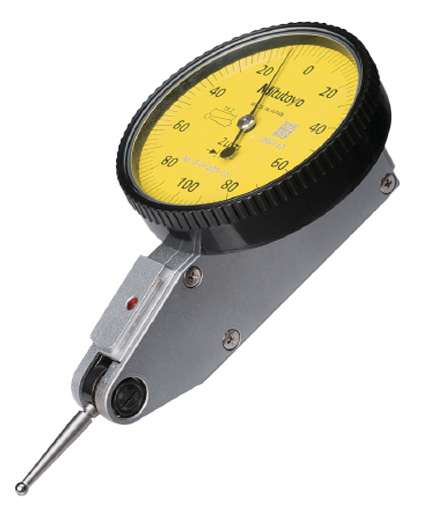
Integrated Impact
The integrated use of Mitutoyo indicators in both tooling setups and quality control provides a robust framework for manufacturing precision. By ensuring machines are correctly calibrated at the beginning and continuously monitoring product quality throughout the manufacturing process, these indicators help maintain a consistent standard of quality. The result is a manufacturing process that is efficient, cost-effective, and capable of producing products that meet or exceed customer expectations in terms of quality and reliability. Thus, Mitutoyo indicators not only support the technical aspects of manufacturing but also contribute to broader business goals such as customer satisfaction and brand reputation.
Impact of Accurate Measurement on Product Quality
The accuracy of measurements in manufacturing is crucial because it directly impacts the quality and performance of the final products. Mitutoyo indicators contribute significantly to maintaining strict quality standards in manufacturing, directly influencing both the reliability of the products and the satisfaction of the customers who use them.
When components and parts are produced, they must meet certain dimensional and functional tolerances—these are the acceptable limits of variation in a physical dimension or measured value. For instance, in an automotive engine, parts such as pistons must fit inside the cylinders within a very small margin of space, in the tens of thousandths, to make sure those critical components not only perform efficiently but don’t fail prematurely due to the wrong tolerances. Mitutoyo indicators are often trust to measure these parts during production to verify that they are within the necessary tolerances.
By using our highly accurate indicators, manufacturers can detect even the slightest deviation from the required specifications. This capability allows for immediate corrections during the manufacturing process, which helps prevent the assembly of defective products for more reliability over a longer period of time.
Furthermore, maintaining high product quality through precise measurements not only enhances product reliability but also boosts customer satisfaction. Customers who receive consistently reliable products are more likely to trust the manufacturer which is particularly important in industries like automotive, aerospace, and medical, where safety, reliability, and repeatability are paramount.
Increasing Efficiency in Manufacturing
Accurate measurements play a critical role in optimizing manufacturing processes by minimizing errors and the need for subsequent corrections or rework. Many different types of Mitutoyo indicators allow manufacturers to ensure that each component is produced correctly the first time in a variety of industries and applications. This precision has several key benefits for manufacturing efficiency and cost management:
Reduction of Errors: When components are measured accurately during the initial stages of production, there is a significant decrease in the likelihood of errors. Components that fit and function correctly do not need to be reworked or scrapped, which can be costly. For instance, in precision engineering, such as in the manufacture of electronic components or intricate mechanical parts, even minor deviations can render a part unusable.
Decrease in Rework: Rework involves revising or remaking a component that does not meet the required standards. This not only doubles the effort but also uses additional materials and labor, increasing the cost per unit. By employing high-accuracy measurement tools, manufacturers can dramatically reduce the incidence of rework, thereby saving on resources and labor.
Improved Production Speed: When measurements are accurate, there is less interruption in the manufacturing process. Production can proceed at a planned pace without unexpected delays caused by the identification and correction of errors. This smoother workflow enhances overall production speed and efficiency.
Cost Savings: The direct consequence of reduced errors and rework is lower production costs. Accurate measurements help in controlling the amount of material used by ensuring each part is cut or machined precisely according to specifications, reducing waste. Additionally, less time spent on fixing errors means lower labor costs and faster time-to-market for products.
Increased Overall Efficiency: With the integration of precise measurement tools like those from Mitutoyo, manufacturing processes become more streamlined, predictable, and efficient. This increase in efficiency can lead to higher production capacities and the ability to meet customer demands more effectively.
The use of Mitutoyo indicators not only ensures the quality of the final product but also optimizes the entire manufacturing process, leading to significant cost savings and increased operational efficiency.
Future Trends in Precision Measurement
As we look to the future, the role of precision measurement tools in manufacturing is set to grow even more prominent. With ongoing advancements in technology, tools like Mitutoyo’s indicators will continue to evolve, providing even greater accuracy and efficiency. This will be crucial for manufacturers aiming to stay at the forefront of quality and innovation.
Mitutoyo indicators are truly indispensable in modern manufacturing by ensuring product quality and efficiency but also drive economic benefits by optimizing production costs. As technology progresses, the integration of these tools in manufacturing processes will become more prevalent, reinforcing their role as a fundamental element of manufacturing excellence.
